Storied career of ‘energiser’ Chief Justice Lucy McCallum
Chief Justice Lucy McCallum once argued jurors are capable, if given the right direction, of putting what they’ve read out of their minds.

Chief Justice Lucy McCallum once argued jurors are capable, if given the right direction, of putting what they’ve read out of their minds.
But when a juror in the Lehrmann rape trial over which she was presiding was discovered on Thursday to have been doing their own research, it clearly crossed a line. Aborting the trial, Justice McCallum ruled: “It may be that no harm has been done but that is not a risk I can take.”
Known in legal circles as “the energiser bunny” for her prodigious workrate, Justice McCallum is famous for having once delivered a four-hour judgment and for her commitment to personal fitness, including formerly running marathons.
She has been in the top role in the ACT Supreme Court since March. At her swearing-in ceremony she told the assembly that among her core beliefs was “that the overrepresentation of Indigenous people in custody is a national tragedy that demands urgent attention”.
“More broadly, the overcrowding of prisons across Australia … reflects an approach to sentencing which prefers isolation of offenders in a custodial setting over early engagement with the endemic problems that contribute to the causes of their offending,” she said.
Prior to her appointment, Justice McCallum had been a judge of the NSW Court of Appeal since 2019 and before that a NSW Supreme Court judge since 2008.
The Lehrmann trial is her most famous trial to date, but she has presided over other high-profile cases including the 2011 sexual harassment case in which a young female lawyer, Bridgette Styles, sued her employer, top-tier law firm Clayton Utz, over claims she had become the target of an office whispering campaign.
Justice McCallum is thought to have been the first judge in Australia to consider whether Twitter constituted a separate publication of defamatory material.
Justice McCallum took law and arts degrees at UNSW in 1986 and worked first at the law firm of Mallesons Stephen Jaques, specialising in commercial litigation, before she joined the Director of Public Prosecutions.
She became a barrister in 1991 in Sydney, and a senior counsel in 2005. Her practice included administrative, environmental, professional negligence, defamation, trade practices, and competition law. She was one of the counsel assisting the HIH Royal Commission.



